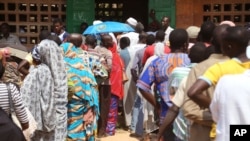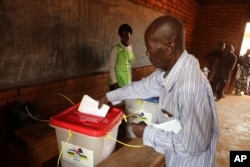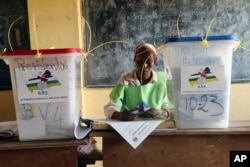Voters went to the polls in the Central African Republic Wednesday, in a much-delayed election that many hope will end three years of violence in the troubled country.
Long lines of voters turned out in the capital, Bangui, and although some polling stations opened late, there were no reported clashes or major irregularities.
Security was high for the presidential and legislative polls, which were delayed from Sunday to deal with logistical difficulties.
U.N. peacekeepers were deployed to sensitive areas, with 300 members of the armed forces on guard in Bangui, and 1,800 police and gendarmes standing watch in other areas of the country.
U.N. Secretary-General Ban Ki-moon has called for "all national stakeholders to commit themselves to ensuring that the elections are conducted in a peaceful and credible manner."
30 presidential candidates
More than 1.8 million people were registered to vote, choosing among some 30 presidential candidates and many others running for the legislature. Among the presidential candidates, former prime ministers Martin Ziguele and Anicet Georges Dologuele are seen as favorites.
Eugene Pehoua Pelema, political analyst and president of the Central African Community, says he does not expect the election to be free and fair.
'I don't believe that this election will be free and fair. There are armed groups all over the place, all around the place. Even the organization of the election is not well done. As you can see, they were supposed to vote last Sunday, but they postponed by three days. And I think until now they still have some logistical problems on the ground."
Pelema says he believes whoever wins the election should make security the first priority. But he says the new president's progress will be hampered by the fact that the country still depends so much on foreign forces to provide security. He says the current, provisional government has done little to quash the armed groups that still wield power around the nation.
"They have done nothing to disarm the armed groups," Pelema says. "They put an embargo on the C.A.R. army so the C.A.R. army cannot provide security."
Runoff predicted
With so many candidates running for the presidency, Pelema predicts a runoff election that will likely include Ziguele, Dologuele, and former foreign minister Abdoul Karim Meckassoua.
On December 13, 93 percent of voters approved a constitutional referendum that would limit the president to two five-year terms, cut the power of the military and ensure religious freedom.
But election officials said that turnout was only 38 percent in that decision.
The vote on the referendum was marred by sporadic violence, with the Red Cross reporting that five people were killed and at least 20 others injured on election day as supporters and opponents of the referendum traded gunfire in the capital, Bangui. The violence prompted United Nations peacekeepers to intervene and bolster security.
Unrest also was said to have disrupted voting in the north of the country.
Thousands have been killed in the C.A.R. and hundreds of thousands driven from their homes since Muslim Seleka rebels ousted President Francois Bozize in 2013. This led to the rise of a Christian militia and brutal fighting between Christians and Muslims.
A U.N. peacekeeping force is in the C.A.R. and Pope Francis visited last month, urging peace.
The country, a small nation of nearly 5 million people, has experienced frequent conflicts and coups since winning independence from France in 1960.
James Butty contributed to this report.













